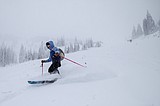U.S. House passes gateway community legislation
KATE HESTON | Hagadone News Network | UPDATED 1 year, 8 months AGO
Kate Heston covers politics and natural resources for the Daily Inter Lake. She is a graduate of the University of Iowa's journalism program, previously worked as photo editor at the Daily Iowan and was a News21 fellow in Phoenix. She can be reached at [email protected] or 406-758-4459. | April 16, 2024 12:00 AM
U.S. Rep. Ryan Zinke’s bipartisan Gateway Communities and Recreation Enhancement Act passed the House of Representatives last week as part of a larger outdoor recreation policy package.
The Expanding Public Lands Outdoor Recreation Experiences Act landed in the Senate on April 10 after earning House approval. The package, co-sponsored by Zinke, a Republican, is aimed at improving public land access, modernizing technology uses, streamlining permitting processes, creating and restoring trails and campgrounds, increasing accessibility and supporting gateway communities.
“Gateway communities face unusual challenges,” Zinke said last week.
Those challenges, according to Zinke, include housing shortages, strained infrastructure and fallout from disagreements or lack of communication between federal and local agencies. Earlier this year, Zinke introduced the Gateway Communities and Recreation Enhancement Act with an eye to supporting communities like those in the Flathead Valley. The act was included within the Explore Act.
Zinke’s legislation would create a digital America the Beautiful National Parks and public lands pass, develop a program to track visitation data in congested areas, require public land agencies to work with local stakeholders to address economic needs and mandate that the National Park Service consult with nearby communities before restricting or changing access to parks.
“The Gateway Communities and Recreation Enhancement Act seeks to solve some of these problems by bringing federal and local stakeholders to the table to collaborate on access and opportunities,” Zinke said in a statement.
Approximately 2.9 million visitors came to Glacier National Park in 2022, spending an estimated $368 million in surrounding communities, according to the National Park Service. That spending had a cumulative benefit to the local economy of $548 million, the service said.
MONTANA REPUBLICAN Sen. Steve Daines carried a version of Zinke’s bill in the upper chamber last year, which is now wrapped into the Senate’s America’s Outdoor Recreation Act, the counterpart to the House’s Explore Act.
There are two other priorities that Daines secured into the larger Senate package, according to his office. Those include the Simplifying Outdoor Access for Recreation Act, which streamlines the process to get special recreation permits for accessing public lands, and the Forest Service Flexible Housing Partnerships Act, which will reauthorize a program that allows the federal agency to lease underutilized sites to address housing needs for rural communities.
“Montana’s gateway communities play an important role in our state’s economy and help welcome folks from all over the world to our beautiful national parks,” Daines said in a statement. “My bipartisan bill has now passed both Senate and House committees and I’ll keep working to get it signed into law.”
In September, Flathead County Commissioner Randy Brodehl testified in front of the House Federal Lands Subcommittee on behalf of Zinke’s legislation for gateway communities.
“When the federal government pushes down on our gateway communities, we can suffer millions of dollars in economic loss,” Brodehl told the subcommittee last year.
Ideally, according to Zinke, the legislation should ensure that the public retains access to national parks without placing an unnecessary burden on the communities around the parks.
“It'll ensure that decisions that affect not only the park but the areas around it are coordinated in advance,” Zinke said.
Reporter Kate Heston can be reached at [email protected] or 758-4459.
ARTICLES BY KATE HESTON

Veteran-owned mobile boat repair service anchors down in the Flathead Valley
The Kramers launched Flathead Mobile Marine to use their skills — they have decades of experience performing routine maintenance checks on a variety of boats as well as working with engines and electrical systems — and help boaters in the community.

With ski season near, resort reaches deal with staff
After 18 months of negotiations, Whitefish Mountain Resort executives and the resort’s ski patrol union are finalizing a one-year contract for the upcoming season.

Trapped in a car wreck, Woods Bay woman credits teens with saving her life
Driving home from a quilting event in Bigfork in September of last year, Carol Martin remembered that the sky was clear, the sun was shining, and she had a headache.

